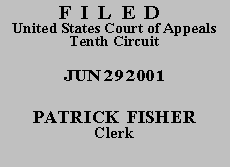

| DAVID R. TINKLE,
Plaintiff-Appellant, v. OKLAHOMA GAS & ELECTRIC COMPANY, Defendant-Appellee. |
|
Plaintiff David Tinkle appeals from the magistrate judge's summary judgment dismissal of his complaint against his former employer, Oklahoma Gas and Electric Company (OG&E).(1) Plaintiff alleged age discrimination under the Age Discrimination in Employment Act, 29 U.S.C. §§ 621-34; interference with his right to receive benefits in violation of the Employee Retirement Income Security Act, 29 U.S.C. § 1140; intentional or negligent infliction of mental or emotional distress; and retaliation for his participation in another employee's age discrimination claim. On appeal, plaintiff challenges only the dismissal of his retaliation claim.(2) Therefore, all other issues that were decided by the magistrate judge are considered waived. See State Farm Fire & Cas. Co. v. Mhoon, 31 F.3d 979, 984 n.7 (10th Cir. 1994). We affirm.
The parties are familiar with the facts, which are fully set out in the magistrate judge's very thorough thirty-one page order. Thus, we will only briefly repeat those necessary to resolve the appeal. Plaintiff was employed by OG&E in its heavy hauling department. In March 1997, he was listed as a witness against OG&E in an age discrimination claim brought by another OG&E employee, Don Riffel, but he refused to meet with OG&E's attorney to discuss the Riffel case. Plaintiff also had neck surgery that month. When he returned to work in April, his supervisor, John Singleton, refused plaintiff's request to be assigned to drive an air-suspension ride truck, which has a softer ride than other trucks. Plaintiff claims his request was refused because of his participation in the Riffel case.
Plaintiff gave his deposition in the Riffel case in June 1997, providing some evidence that Singleton discriminated against Riffel because of his age. In August 1997, Singleton ordered plaintiff to drive a seventy-five ton crane. Plaintiff claims that this crane has a rough and bumpy drive and that he injured his neck driving it. He claims Singleton made him drive the crane in retaliation for his deposition testimony. Thereafter, plaintiff's doctor restricted him to light duty work assignments for two weeks, and plaintiff alleges Singleton refused to give him available light work assignments.
To establish a prima facie case of retaliation, plaintiff must show he was engaged in protected opposition to age discrimination, he was subjected to adverse employment action, and a causal connection existed between the protected activity and the adverse employment action. Sanchez v. Denver Pub. Sch., 164 F.3d 527, 533 (10th Cir. 1998). We have reviewed the briefs and the record on appeal, and are not persuaded by plaintiff's claims of error. His allegations that Singleton refused plaintiff's requested truck assignment or assigned him to drive the crane do not rise to the level of an adverse employment action. See id. at 532 (explaining that "mere inconvenience or an alteration of job responsibilities" does not constitute "adverse employment action," which requires a "significant change in employment status" (quotations omitted)). Further, there is no record support for plaintiff's assertion that Singleton refused him available light-duty job assignments after he injured his neck in August. The magistrate judge properly disregarded statements in plaintiff's affidavit that contradicted his earlier sworn deposition testimony. See Kendrick v. Penske Transp. Servs., Inc., 220 F.3d 1220, 1224 n.2 (10th Cir. 2000). Plaintiff's evidence demonstrates only that some employees were given short-term, light-duty assignments for various medical reasons. However, plaintiff failed to present any evidence of any specific light-duty work that was available for him to do after his injury and it is undisputed that plaintiff never applied for any light-duty work assignments.
Plaintiff also failed to present evidence that a causal connection existed between his participation in the Riffel case and the alleged adverse employment actions. He presented no evidence that Singleton had any knowledge that plaintiff was a witness in the Riffel case, had refused to cooperate with an OG&E attorney or had given deposition testimony implicating Singleton. A party opposing summary judgment cannot rest upon his pleadings, but "must bring forward specific facts showing a genuine issue for trial as to those dispositive matters for which [he or she] carries the burden of proof." Jenkins v. Wood, 81 F.3d 988, 990 (10th Cir. 1996).
The magistrate judge thoroughly addressed the arguments plaintiff raises on appeal, and we AFFIRM for substantially the same reasons as set forth in the magistrate judge's order filed on July 17, 2000.
Entered for the Court
Circuit Judge
*. This order and judgment is not binding precedent, except under the doctrines of law of the case, res judicata, and collateral estoppel. The court generally disfavors the citation of orders and judgments; nevertheless, an order and judgment may be cited under the terms and conditions of 10th Cir. R. 36.3.
1. The parties consented to disposition of this case by the magistrate judge. See 28 U.S.C. § 636(c)(3).
2. At the conclusion of his brief, plaintiff summarily requests the court to also reverse his age discrimination claim. Plaintiff does not otherwise argue his age discrimination claim in his brief. Accordingly, we do not address this claim on appeal. See Ambus v. Granite Bd. of Educ., 975 F.2d 1555, 1558 n.1 (10th Cir. 1992) (stating an issue mentioned in brief on appeal, but not addressed, is waived), modified on other grounds on reh'g, 995 F.2d 992 (10th Cir. 1993); Fed. R. App. P. 28(a)(9)(A) (requiring that argument contain the "appellant's contentions and the reasons for them, with citations to the authorities and parts of the record on which the appellant relies").